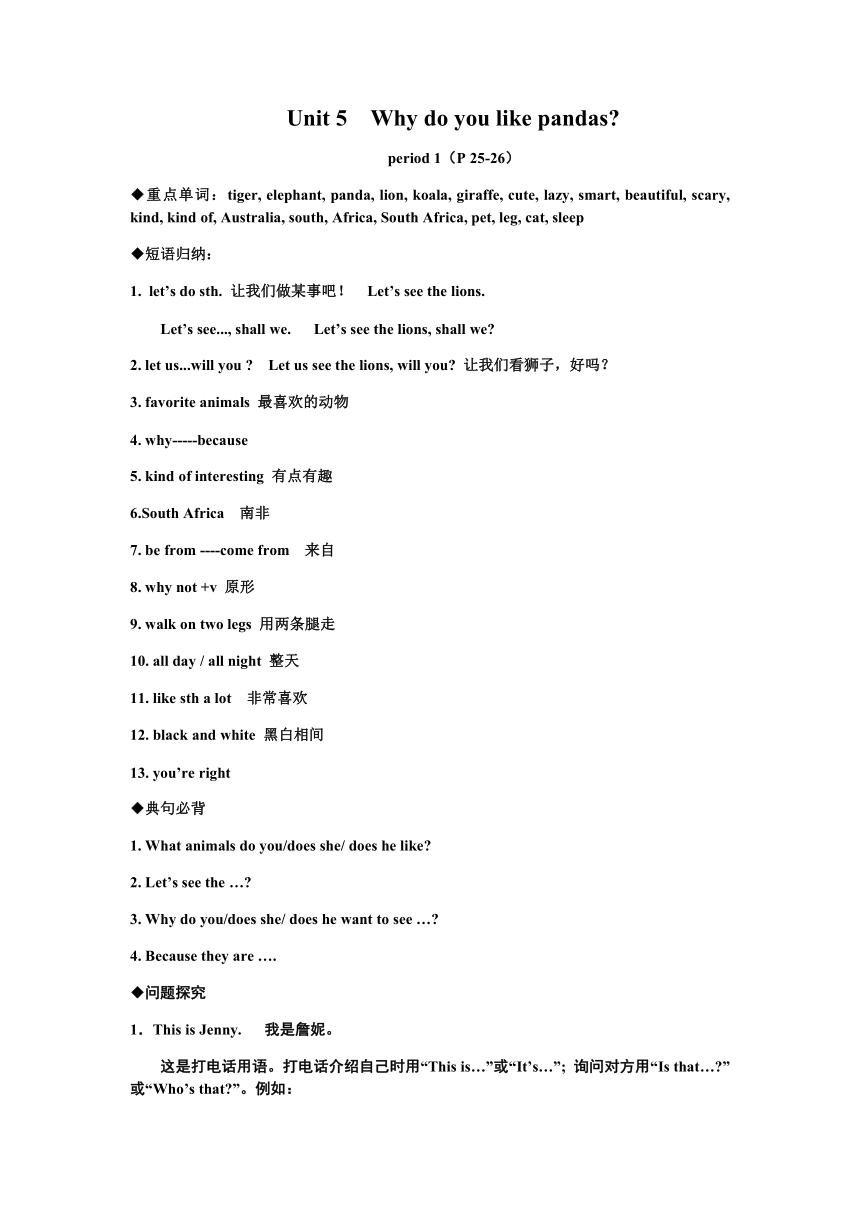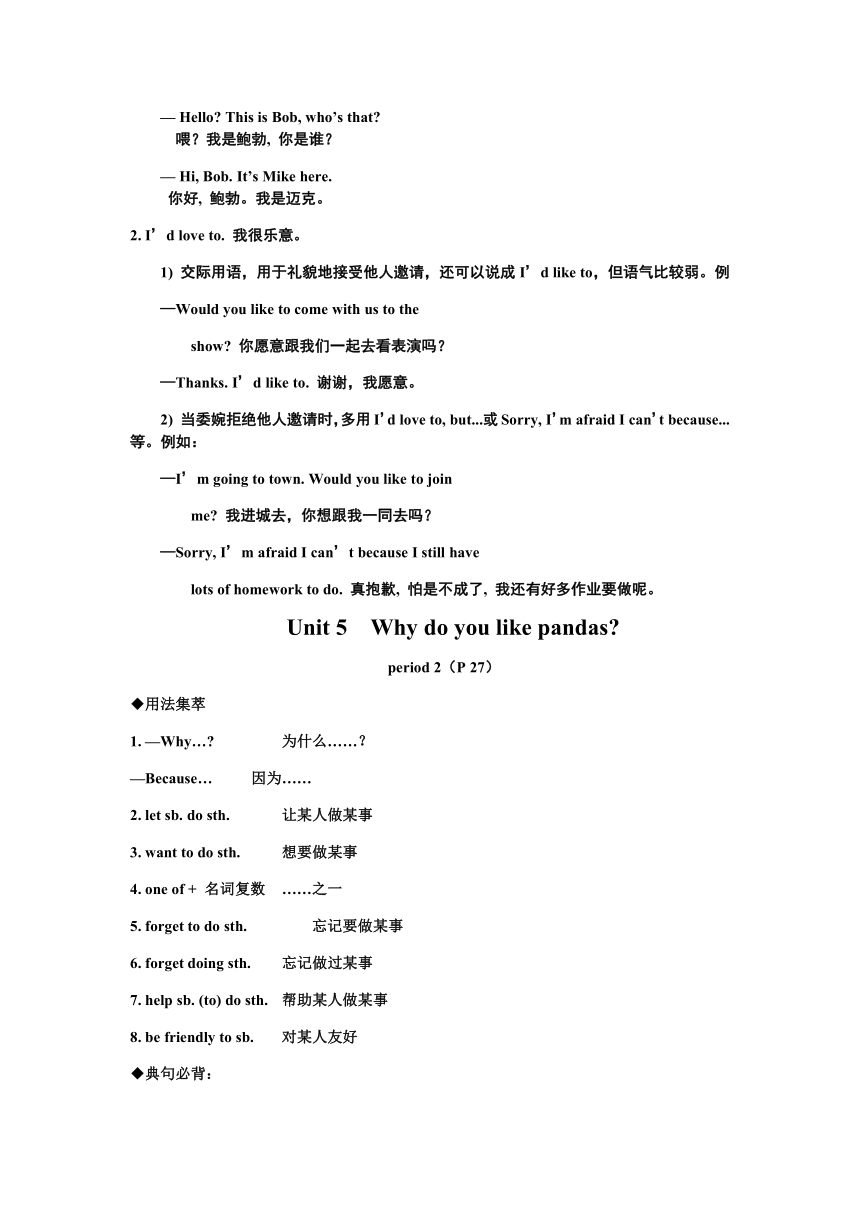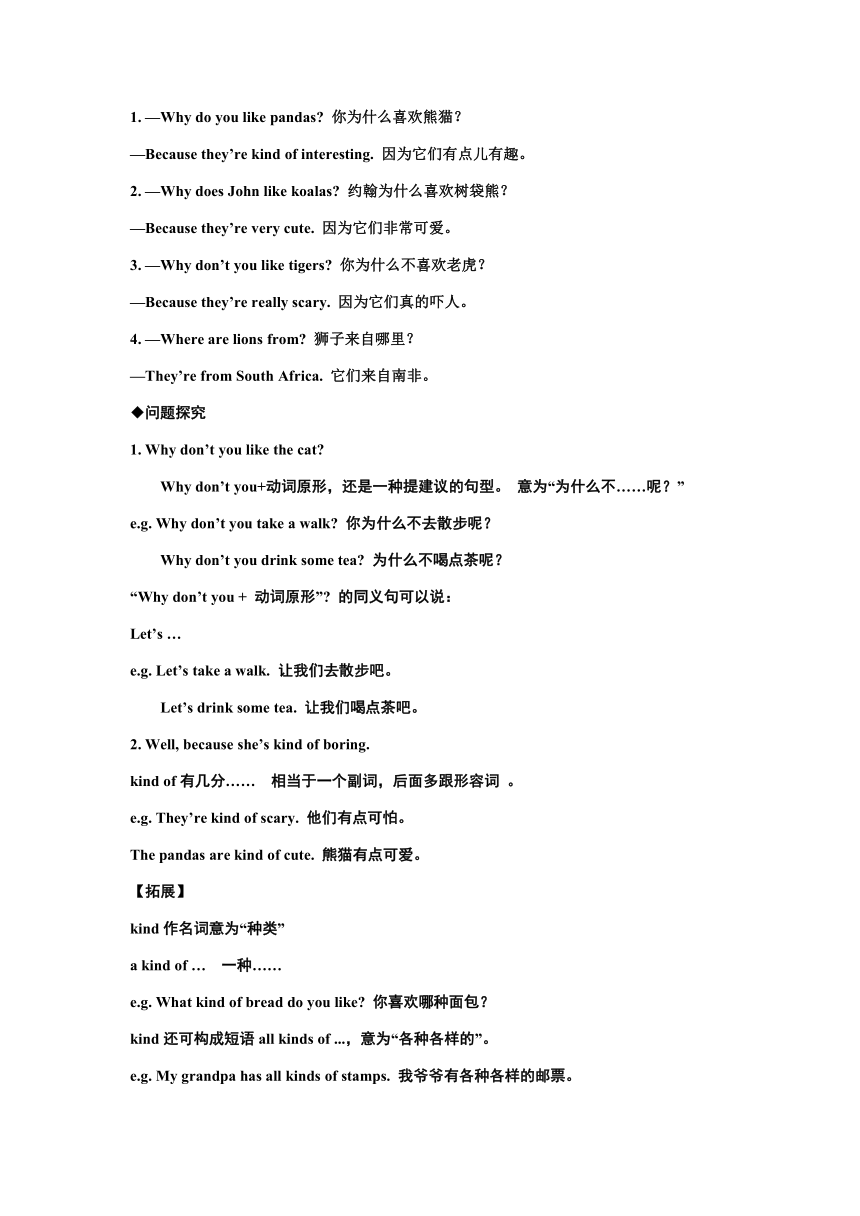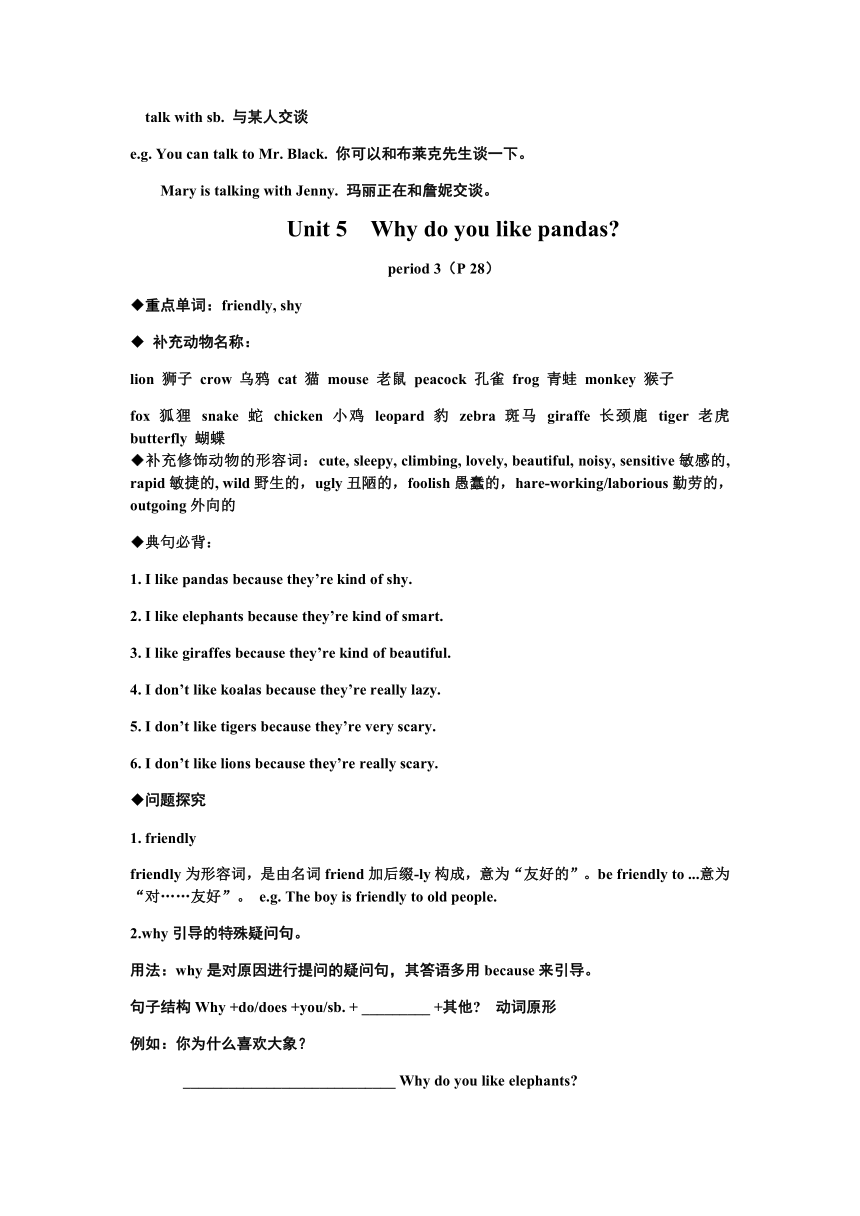Unit 5Why do you like pandas暑假复习学案
文档属性
| 名称 | Unit 5Why do you like pandas暑假复习学案 |  | |
| 格式 | docx | ||
| 文件大小 | 119.2KB | ||
| 资源类型 | 教案 | ||
| 版本资源 | 人教新目标(Go for it)版 | ||
| 科目 | 英语 | ||
| 更新时间 | 2023-08-08 23:07:22 | ||
图片预览




文档简介
Unit 5 Why do you like pandas
period 1(P 25-26)
◆重点单词:tiger, elephant, panda, lion, koala, giraffe, cute, lazy, smart, beautiful, scary, kind, kind of, Australia, south, Africa, South Africa, pet, leg, cat, sleep
◆短语归纳:
let’s do sth. 让我们做某事吧! Let’s see the lions.
Let’s see..., shall we. Let’s see the lions, shall we
2. let us...will you Let us see the lions, will you 让我们看狮子,好吗?
3. favorite animals 最喜欢的动物
4. why-----because
5. kind of interesting 有点有趣
6.South Africa 南非
7. be from ----come from 来自
8. why not +v 原形
9. walk on two legs 用两条腿走
10. all day / all night 整天
11. like sth a lot 非常喜欢
12. black and white 黑白相间
13. you’re right
◆典句必背
1. What animals do you/does she/ does he like
2. Let’s see the …
3. Why do you/does she/ does he want to see …
4. Because they are ….
◆问题探究
1.This is Jenny. 我是詹妮。
这是打电话用语。打电话介绍自己时用“This is…”或“It’s…”; 询问对方用“Is that… ”或“Who’s that ”。例如:
— Hello This is Bob, who’s that
喂?我是鲍勃, 你是谁?
— Hi, Bob. It’s Mike here.
你好, 鲍勃。我是迈克。
2. I’d love to. 我很乐意。
1) 交际用语,用于礼貌地接受他人邀请,还可以说成I’d like to,但语气比较弱。例
—Would you like to come with us to the
show 你愿意跟我们一起去看表演吗?
—Thanks. I’d like to. 谢谢,我愿意。
2) 当委婉拒绝他人邀请时,多用I’d love to, but...或Sorry, I’m afraid I can’t because...等。例如:
—I’m going to town. Would you like to join
me 我进城去,你想跟我一同去吗?
—Sorry, I’m afraid I can’t because I still have
lots of homework to do. 真抱歉, 怕是不成了, 我还有好多作业要做呢。
Unit 5 Why do you like pandas
period 2(P 27)
◆用法集萃
1. —Why… 为什么……?
—Because… 因为……
2. let sb. do sth. 让某人做某事
3. want to do sth. 想要做某事
4. one of + 名词复数 ……之一
5. forget to do sth. 忘记要做某事
6. forget doing sth. 忘记做过某事
7. help sb. (to) do sth. 帮助某人做某事
8. be friendly to sb. 对某人友好
◆典句必背:
1. —Why do you like pandas 你为什么喜欢熊猫?
—Because they’re kind of interesting. 因为它们有点儿有趣。
2. —Why does John like koalas 约翰为什么喜欢树袋熊?
—Because they’re very cute. 因为它们非常可爱。
3. —Why don’t you like tigers 你为什么不喜欢老虎?
—Because they’re really scary. 因为它们真的吓人。
4. —Where are lions from 狮子来自哪里?
—They’re from South Africa. 它们来自南非。
◆问题探究
1. Why don’t you like the cat
Why don’t you+动词原形,还是一种提建议的句型。 意为“为什么不……呢?”
e.g. Why don’t you take a walk 你为什么不去散步呢?
Why don’t you drink some tea 为什么不喝点茶呢?
“Why don’t you + 动词原形” 的同义句可以说:
Let’s …
e.g. Let’s take a walk. 让我们去散步吧。
Let’s drink some tea. 让我们喝点茶吧。
2. Well, because she’s kind of boring.
kind of有几分…… 相当于一个副词,后面多跟形容词 。
e.g. They’re kind of scary. 他们有点可怕。
The pandas are kind of cute. 熊猫有点可爱。
【拓展】
kind作名词意为“种类”
a kind of … 一种……
e.g. What kind of bread do you like 你喜欢哪种面包?
kind还可构成短语all kinds of ...,意为“各种各样的”。
e.g. My grandpa has all kinds of stamps. 我爷爷有各种各样的邮票。
talk with sb. 与某人交谈
e.g. You can talk to Mr. Black. 你可以和布莱克先生谈一下。
Mary is talking with Jenny. 玛丽正在和詹妮交谈。
Unit 5 Why do you like pandas
period 3(P 28)
◆重点单词:friendly, shy
◆ 补充动物名称:
lion 狮子 crow 乌鸦 cat 猫 mouse 老鼠 peacock 孔雀 frog 青蛙 monkey 猴子
fox 狐狸 snake 蛇 chicken 小鸡 leopard 豹 zebra 斑马 giraffe 长颈鹿 tiger 老虎 butterfly 蝴蝶
◆补充修饰动物的形容词:cute, sleepy, climbing, lovely, beautiful, noisy, sensitive敏感的, rapid敏捷的, wild野生的,ugly丑陋的,foolish愚蠢的,hare-working/laborious勤劳的,outgoing外向的
◆典句必背:
1. I like pandas because they’re kind of shy.
2. I like elephants because they’re kind of smart.
3. I like giraffes because they’re kind of beautiful.
4. I don’t like koalas because they’re really lazy.
5. I don’t like tigers because they’re very scary.
6. I don’t like lions because they’re really scary.
◆问题探究
1. friendly
friendly为形容词,是由名词friend加后缀-ly构成,意为“友好的”。be friendly to ...意为“对……友好”。 e.g. The boy is friendly to old people.
2.why引导的特殊疑问句。
用法:why是对原因进行提问的疑问句,其答语多用because来引导。
句子结构Why +do/does +you/sb. + _________ +其他 动词原形
例如:你为什么喜欢大象?
____________________________ Why do you like elephants
因为它们聪明。
____________________________ Because they’re kind of smart.
where引导的特殊疑问句询问来自 哪里。
句子结构Where + _____ + 名词 + _____ are…from…答语:They are+ from …
考拉来自哪里?___________________________ Where are koalas from
他们来自澳大利亚。___________________________ They are from Australia.
长颈鹿来自哪里?___________________________ Where are giraffes from
它们来自非洲。 ___________________________ They are from Africa.
形容词在句子中的用法。
1) 形容词在句子中作表语,置于________之后。系动词如:
________________________ Elephants are kind of smart. 大象很聪明。
______________________ Lions are really scary. 狮子真得有点吓人。
2. 形容词在句子中作定语。形容词+______ 名词
杰克是个聪明的孩子。 ____________________________ Jack is a clever boy.
这是一本有趣的故事书。____________________________ This is an interesting story book.
Unit 5 Why do you like pandas
period 4(P 29)
◆重点单词:save, symbol, flag, forget, place, water, danger, cut, down, cut down, tree, kill, ivory, over
◆短语归纳:
1. more than =over 超过/多于
2. the other two animals 另外两个动物
3. one of +名词复数+名词复数
4. a kind of books 一种书
5. our first flag 我们的第一面旗
6. a symbol of good luck 好运的象征
7. play soccer or music 踢足球/播放音乐
8. draw well 画得好
9. forget to do 忘记做某事
10. get/be lost 迷路
11. a good place to do sth 做某事的好地方
12. a good place with food and water带着食物和水的地方
13. in great danger 处于危险
14. cut down 砍倒
15. be made of 什么制成 things made of ivory 由象牙制成的东西
16.Thai Elephant Day 大象节
17. importance in Thailand 泰国的重要性
18. all day 整天
19. for a long time 很长时间
◆典句必背:
1. Elephants can walk for a long time and never get lost. 大象能走很长时间并且从不迷路。
2. They can also remember places with food and water. 它们也能记住有食物和水的地方。
3. But elephants are in great danger. 但是,大象处于极大危险之中。
4. People cut down many trees so elephants are losing their homes.
人们砍倒了许多树,因此,大象渐渐失去它们的家园。
5. Today there are only about 3,000 elephants (over 100,000 before)
现在仅有大约3000头大象(之前超过10万头大象)。
6. Our first flag had a white elephant on it.我们的第一面国旗上就(绘)有一头白象。
7. People say that “an elephant never forgets”.人们说“大象从来不会忘记”。
8. Elephants can walk for a long time and never get lost.大象能够长时间行走而且从不迷路。
9. We must save the trees and not buy things make of ivory.我们必须拯救树木,拒买象牙制品。
◆问题探究
1.be in (great) danger 处于(极大)危险之中
e.g. The boy falls into the lake. He’s in great danger. 小男孩落入湖中,他处于极大危险中。
英语中,常用形容词big或great与danger搭配,表示“巨大的危险”。
(be) out of danger 脱离危险
e.g. The doctors say he’s now out of danger. 大夫们说现在他脱离了危险。
Unit 5 Why do you like pandas
period 5(P 30)
◆典句必背:
Isn’t she beautiful 她难道不美丽吗?
Welcome to the zoo.欢迎光临动物园
◆知识拓展
1. 有关3,000和100,000的读法
3000→three thousand
100,000→one hundred thousand
2. lost作为形容词,表示“走失的;迷路的;失散的”、“丢失的;遗失的”,
常与系动词get或be一同构成短语,表示“丢失;走失;迷路”。
e.g. What bad luck! My keys are lost again. 真是倒霉!我的钥匙又丢了。
The little girl can’t find her home. She gets lost. 小女孩找不到家了,她迷路了。
lost还经常直接用于名词之前,做定语修饰名词。
e.g. a lost child 走丢了的孩子the lost tourists 迷了路的游客们
a lost watch 被人遗失的手表
◆话题写作
The Animal I Like
There are many kinds of animals in the world. What animal do I like Let’s know her.
Many people like her very much. I also like her. She is from China. She is very cute. She doesn’t eat grass and meat at all. She eats bamboo every day. She is so nice. She is black white. She has two big black ears and eyes. And she also has black legs and arms.
What animal is she She is a panda. I like panda very much. Do you like her What animal do you like
◆单元小结
◆教学反思
period 1(P 25-26)
◆重点单词:tiger, elephant, panda, lion, koala, giraffe, cute, lazy, smart, beautiful, scary, kind, kind of, Australia, south, Africa, South Africa, pet, leg, cat, sleep
◆短语归纳:
let’s do sth. 让我们做某事吧! Let’s see the lions.
Let’s see..., shall we. Let’s see the lions, shall we
2. let us...will you Let us see the lions, will you 让我们看狮子,好吗?
3. favorite animals 最喜欢的动物
4. why-----because
5. kind of interesting 有点有趣
6.South Africa 南非
7. be from ----come from 来自
8. why not +v 原形
9. walk on two legs 用两条腿走
10. all day / all night 整天
11. like sth a lot 非常喜欢
12. black and white 黑白相间
13. you’re right
◆典句必背
1. What animals do you/does she/ does he like
2. Let’s see the …
3. Why do you/does she/ does he want to see …
4. Because they are ….
◆问题探究
1.This is Jenny. 我是詹妮。
这是打电话用语。打电话介绍自己时用“This is…”或“It’s…”; 询问对方用“Is that… ”或“Who’s that ”。例如:
— Hello This is Bob, who’s that
喂?我是鲍勃, 你是谁?
— Hi, Bob. It’s Mike here.
你好, 鲍勃。我是迈克。
2. I’d love to. 我很乐意。
1) 交际用语,用于礼貌地接受他人邀请,还可以说成I’d like to,但语气比较弱。例
—Would you like to come with us to the
show 你愿意跟我们一起去看表演吗?
—Thanks. I’d like to. 谢谢,我愿意。
2) 当委婉拒绝他人邀请时,多用I’d love to, but...或Sorry, I’m afraid I can’t because...等。例如:
—I’m going to town. Would you like to join
me 我进城去,你想跟我一同去吗?
—Sorry, I’m afraid I can’t because I still have
lots of homework to do. 真抱歉, 怕是不成了, 我还有好多作业要做呢。
Unit 5 Why do you like pandas
period 2(P 27)
◆用法集萃
1. —Why… 为什么……?
—Because… 因为……
2. let sb. do sth. 让某人做某事
3. want to do sth. 想要做某事
4. one of + 名词复数 ……之一
5. forget to do sth. 忘记要做某事
6. forget doing sth. 忘记做过某事
7. help sb. (to) do sth. 帮助某人做某事
8. be friendly to sb. 对某人友好
◆典句必背:
1. —Why do you like pandas 你为什么喜欢熊猫?
—Because they’re kind of interesting. 因为它们有点儿有趣。
2. —Why does John like koalas 约翰为什么喜欢树袋熊?
—Because they’re very cute. 因为它们非常可爱。
3. —Why don’t you like tigers 你为什么不喜欢老虎?
—Because they’re really scary. 因为它们真的吓人。
4. —Where are lions from 狮子来自哪里?
—They’re from South Africa. 它们来自南非。
◆问题探究
1. Why don’t you like the cat
Why don’t you+动词原形,还是一种提建议的句型。 意为“为什么不……呢?”
e.g. Why don’t you take a walk 你为什么不去散步呢?
Why don’t you drink some tea 为什么不喝点茶呢?
“Why don’t you + 动词原形” 的同义句可以说:
Let’s …
e.g. Let’s take a walk. 让我们去散步吧。
Let’s drink some tea. 让我们喝点茶吧。
2. Well, because she’s kind of boring.
kind of有几分…… 相当于一个副词,后面多跟形容词 。
e.g. They’re kind of scary. 他们有点可怕。
The pandas are kind of cute. 熊猫有点可爱。
【拓展】
kind作名词意为“种类”
a kind of … 一种……
e.g. What kind of bread do you like 你喜欢哪种面包?
kind还可构成短语all kinds of ...,意为“各种各样的”。
e.g. My grandpa has all kinds of stamps. 我爷爷有各种各样的邮票。
talk with sb. 与某人交谈
e.g. You can talk to Mr. Black. 你可以和布莱克先生谈一下。
Mary is talking with Jenny. 玛丽正在和詹妮交谈。
Unit 5 Why do you like pandas
period 3(P 28)
◆重点单词:friendly, shy
◆ 补充动物名称:
lion 狮子 crow 乌鸦 cat 猫 mouse 老鼠 peacock 孔雀 frog 青蛙 monkey 猴子
fox 狐狸 snake 蛇 chicken 小鸡 leopard 豹 zebra 斑马 giraffe 长颈鹿 tiger 老虎 butterfly 蝴蝶
◆补充修饰动物的形容词:cute, sleepy, climbing, lovely, beautiful, noisy, sensitive敏感的, rapid敏捷的, wild野生的,ugly丑陋的,foolish愚蠢的,hare-working/laborious勤劳的,outgoing外向的
◆典句必背:
1. I like pandas because they’re kind of shy.
2. I like elephants because they’re kind of smart.
3. I like giraffes because they’re kind of beautiful.
4. I don’t like koalas because they’re really lazy.
5. I don’t like tigers because they’re very scary.
6. I don’t like lions because they’re really scary.
◆问题探究
1. friendly
friendly为形容词,是由名词friend加后缀-ly构成,意为“友好的”。be friendly to ...意为“对……友好”。 e.g. The boy is friendly to old people.
2.why引导的特殊疑问句。
用法:why是对原因进行提问的疑问句,其答语多用because来引导。
句子结构Why +do/does +you/sb. + _________ +其他 动词原形
例如:你为什么喜欢大象?
____________________________ Why do you like elephants
因为它们聪明。
____________________________ Because they’re kind of smart.
where引导的特殊疑问句询问来自 哪里。
句子结构Where + _____ + 名词 + _____ are…from…答语:They are+ from …
考拉来自哪里?___________________________ Where are koalas from
他们来自澳大利亚。___________________________ They are from Australia.
长颈鹿来自哪里?___________________________ Where are giraffes from
它们来自非洲。 ___________________________ They are from Africa.
形容词在句子中的用法。
1) 形容词在句子中作表语,置于________之后。系动词如:
________________________ Elephants are kind of smart. 大象很聪明。
______________________ Lions are really scary. 狮子真得有点吓人。
2. 形容词在句子中作定语。形容词+______ 名词
杰克是个聪明的孩子。 ____________________________ Jack is a clever boy.
这是一本有趣的故事书。____________________________ This is an interesting story book.
Unit 5 Why do you like pandas
period 4(P 29)
◆重点单词:save, symbol, flag, forget, place, water, danger, cut, down, cut down, tree, kill, ivory, over
◆短语归纳:
1. more than =over 超过/多于
2. the other two animals 另外两个动物
3. one of +名词复数+名词复数
4. a kind of books 一种书
5. our first flag 我们的第一面旗
6. a symbol of good luck 好运的象征
7. play soccer or music 踢足球/播放音乐
8. draw well 画得好
9. forget to do 忘记做某事
10. get/be lost 迷路
11. a good place to do sth 做某事的好地方
12. a good place with food and water带着食物和水的地方
13. in great danger 处于危险
14. cut down 砍倒
15. be made of 什么制成 things made of ivory 由象牙制成的东西
16.Thai Elephant Day 大象节
17. importance in Thailand 泰国的重要性
18. all day 整天
19. for a long time 很长时间
◆典句必背:
1. Elephants can walk for a long time and never get lost. 大象能走很长时间并且从不迷路。
2. They can also remember places with food and water. 它们也能记住有食物和水的地方。
3. But elephants are in great danger. 但是,大象处于极大危险之中。
4. People cut down many trees so elephants are losing their homes.
人们砍倒了许多树,因此,大象渐渐失去它们的家园。
5. Today there are only about 3,000 elephants (over 100,000 before)
现在仅有大约3000头大象(之前超过10万头大象)。
6. Our first flag had a white elephant on it.我们的第一面国旗上就(绘)有一头白象。
7. People say that “an elephant never forgets”.人们说“大象从来不会忘记”。
8. Elephants can walk for a long time and never get lost.大象能够长时间行走而且从不迷路。
9. We must save the trees and not buy things make of ivory.我们必须拯救树木,拒买象牙制品。
◆问题探究
1.be in (great) danger 处于(极大)危险之中
e.g. The boy falls into the lake. He’s in great danger. 小男孩落入湖中,他处于极大危险中。
英语中,常用形容词big或great与danger搭配,表示“巨大的危险”。
(be) out of danger 脱离危险
e.g. The doctors say he’s now out of danger. 大夫们说现在他脱离了危险。
Unit 5 Why do you like pandas
period 5(P 30)
◆典句必背:
Isn’t she beautiful 她难道不美丽吗?
Welcome to the zoo.欢迎光临动物园
◆知识拓展
1. 有关3,000和100,000的读法
3000→three thousand
100,000→one hundred thousand
2. lost作为形容词,表示“走失的;迷路的;失散的”、“丢失的;遗失的”,
常与系动词get或be一同构成短语,表示“丢失;走失;迷路”。
e.g. What bad luck! My keys are lost again. 真是倒霉!我的钥匙又丢了。
The little girl can’t find her home. She gets lost. 小女孩找不到家了,她迷路了。
lost还经常直接用于名词之前,做定语修饰名词。
e.g. a lost child 走丢了的孩子the lost tourists 迷了路的游客们
a lost watch 被人遗失的手表
◆话题写作
The Animal I Like
There are many kinds of animals in the world. What animal do I like Let’s know her.
Many people like her very much. I also like her. She is from China. She is very cute. She doesn’t eat grass and meat at all. She eats bamboo every day. She is so nice. She is black white. She has two big black ears and eyes. And she also has black legs and arms.
What animal is she She is a panda. I like panda very much. Do you like her What animal do you like
◆单元小结
◆教学反思
同课章节目录
